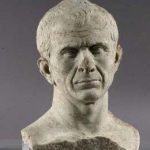When in 58 BCE Julius Caesar was starting his military campaign in Gaul, no one expected a Roman to lead of his legions in just two years he will conquer virtually all of Gaul. At the news of Caesar’s great victory in GaulSenate, at the request of the 2 remaining triumvirs in the capital (Crassus and Pompey) announced over 2 weeks of thanksgiving prayers; the Games were also organized for the Roman people.
Caesar, despite the conquest and enormous riches, still had to contend with the revolts that broke out in various regions of the conquered lands. One of the rebellious tribes were the so-called Venetians who inhabited Aremorica – present-day Brittany. The people were powerful mainly because of their impressive navy and their close trade links with the Dumnonia tribe who lived in the southwest of Britain and the Durotriges tribe, who were more to the east, around what is now Hampshire.
In 56 BCE the aforementioned Venetians (called “children of the sea”) declared war on Rome, the Gauls were supported by their comrades on the Island. Caesar, wanting to defeat the enemy not only on land, had a naval fleet built, which then smashed the Venetians.
Realizing that many of the Gallic refugees were taking refuge in Britania and that the peoples there were giving regular support to the conquered tribes, Caesar began to consider invading Britain. The Roman wanted first of all to show that the power of Rome would reach the enemy even beyond the canal. It was also believed that the mysterious Island was a source of valuable goods such as: iron, silver, copper, lead, grain, leather, wool and meat. In addition, Caesar wanted to acquire a mass of new slaves and consolidate his position in the still divided and uncertain Senate.
It is also possible that Caesar was simply curious about what is on the previously unvisited Island, what peoples, customs and in what places can be easily landed – in the case of subsequent trips to Britain.
Caesar initially had great problems persuading his legions to invade. Ultimately, however, the uncertainty and fear of the unknown that possessed the heads of the legionaries gave way to the prospect of great loot and glory. In 55 BCE Caesar at the head of his army landed on British soil.
Ultimately, neither of the two expeditions was successful. It wasn’t until almost a century later that Emperor Claudius would undertake another expedition that would create a new Roman province – Britain.







